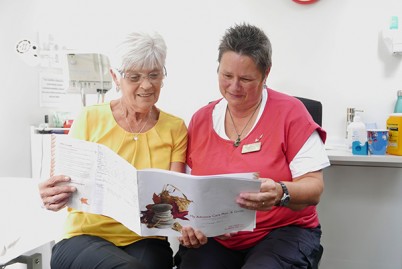Advance care planning
Advance care planning gives everyone a chance to say what’s important to them. It helps people understand what the future might hold and to say what treatment they would and would not want. It helps you, your family and your health care team plan for your future and end-of-life care.
What is Advance Care Planning and why is it important?
Advance Care Planning (ACP), also known as Advance Directives allow you to make specific healthcare choices in advance, ensuring your preferences are made known.
This is particularly important in the case that you are unconscious or have become too unwell and unable to discuss medical treatment options.
We will always discuss your medical treatment options with you. If we cannot, for example because you are unconscious or have become too unwell, we will try to make the best decision for you. If we have a good chance of saving your life and restoring you to good health we will always do everything possible. If the outcome is less certain, then doctors and nurses will use their judgement to decide for you based on what most people would want in the circumstances. An ACP or Advance Directive greatly assists staff by giving them a clear idea of what you want in such circumstances, should you become too unwell to make decisions.
Advance care planning gives everyone a chance to say what treatment they would and would not want, particularly for future and end of life care. Having your wishes in writing helps the important people in your life, and your health care team, if they have to make a decision on your behalf.
Who should make an Advance Care Plan?
Everyone, regardless of their age or health condition to think about, talk about and share what matters to them for their future health care and document this in an ACP. Advance care planning conversations are for everyone. Advance care planning helps people take control of their own healthcare.
Who sees my Advance Care Plan?
ACPs are shared with your GP, healthcare team and loved ones. It may be stored electronically, and accessible to members of your health care team. Once completed an ACP can be reviewed and changed at any time; reviewing a plan on a regular basis is encouraged.
How do I make an Advance Care Plan?
Advance care planning can be done a step at a time at your own pace. The important steps are thinking about and talking about your wishes, writing them down and sharing them and reviewing them.
Kia kōrero | Let’s talk advance care planning resources:
If you would like to include an ACP or Advance Directive in your clinical record, our Patient Affairs staff are available to assist you. If possible, always discuss things with someone you trust, who can convey your wishes in case of doubt.
Liz Harris’s story
Making an Advance Care Plan (ACP) was a priority for Dunedin resident Liz Harris who suffers from a respiratory condition. Liz wants to make sure that her family and healthcare providers know what is important to her when she can no longer speak for herself and is encouraging everyone to make an ACP.
Liz’s mother didn’t have an ACP when she died and this highlighted the importance of having one in place for Liz. “We had to make decisions that we were unsure about as my mum had not told us her wishes. I don’t want that to happen to my family.” says Liz.
“For me, having an ACP in place is one of the most important things I need to do. It gives me peace of mind - it’s a gift to my family so they know my wishes and they don’t have to think about what I would have wanted.”
